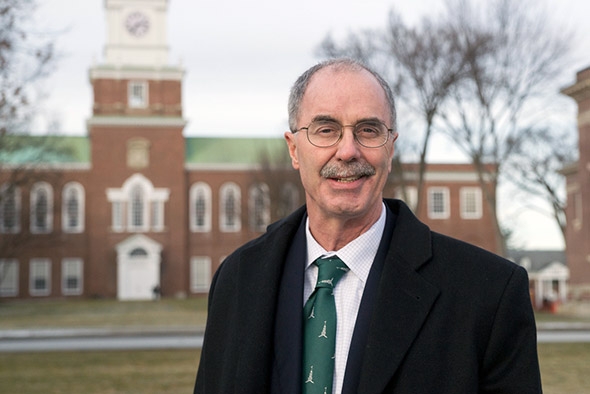The vision for Dartmouth announced this week by President Phil Hanlon ’77 will enhance scholarship, research opportunity, and the undergraduate experience, say faculty leaders and those in the classroom.
In his first major address to the General Faculty, President Hanlon on November 4 outlined his priorities for Dartmouth’s future, which include maintaining the best-in-class undergraduate experience of any college or university, enhancing experiential learning opportunities and innovation, increasing the size of the faculty, adding more undergraduate access to the Tuck School of Business, and expanding the faculty and increasing research and project opportunities at Thayer School of Engineering.

On November 4, in his first major address to the General Faculty, President Phil Hanlon ’77 outlined his priorities for Dartmouth’s future. (Photo by Eli Burakian ’00)
“President Hanlon is really celebrating the entire undergraduate enterprise and what is important in a Dartmouth education,” says Dean of the Faculty of Arts & Sciences Michael Mastanduno. “A signature part of the Dartmouth experience is to take extraordinary undergraduates and give them close working access to a faculty that is both dedicated to teaching and mentoring and distinguished in research.”
Hanlon also wants to give students access to another type of scholar, this one not far removed from the undergraduate ranks. With the new Society of Fellows, the president will bring to the College academics who have just finished their PhD degrees. While Dartmouth has a number of post-doctoral fellowship programs, the Society, beginning with about two dozen fellows, will add to the post-doc community, giving the College a critical mass of young scholars.
This middle layer of scholars will be most welcome, says Associate Professor of Psychological and Brain Sciences Thalia Wheatley.
“Postdoctoral fellows bring not only expertise in their fields but new ideas and energy. They tend to be the ones pushing hardest against a field’s historical boundaries and the ones creating new links across disciplines. In collaboration with more established faculty, they help drive innovation. This is a terrifically exciting development for Dartmouth,” she says.
The president’s emphasis on experiential learning will build on existing “hands-on” education, says Nina Pavcnik, a professor of economics and the Neihaus Professor of International Studies.
“Economics majors currently experience hands-on learning in their senior-year culminating seminar. The department is eager to expand these opportunities for students and introduce them earlier in the major,” Pavcnik says.
Hanlon’s plans to expand Thayer will create more opportunity for students—both engineering majors and those who major in other subjects, says Thayer Dean Joseph Helble.
With about 10 percent of the student body majoring in engineering and another 500 undergraduates taking courses at Thayer each year, faculty expansion at the school will lower the student-teacher ratio, offer more opportunities for students to do research with faculty, and expand access to popular project-based courses that have as a foundation the experiential learning that is a hallmark of Hanlon’s vision.
“This is going to go a long way toward significantly enhancing the undergraduate experience,” Helble says. “Students will have more access to courses that will give them knowledge that they can apply directly to real world challenges, and not only in engineering, but across the liberal arts as well.”
“This kind of hands-on opportunity will be even more of a defining element of the Dartmouth experience,” he says.
> Transcript of President Hanlon’s full remarks
> Video of President Hanlon’s full remarks
